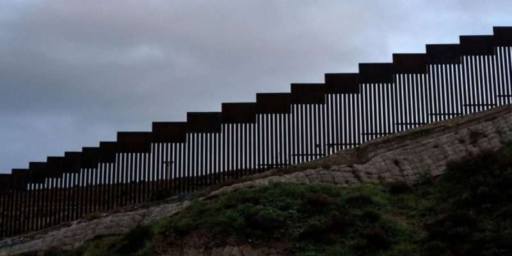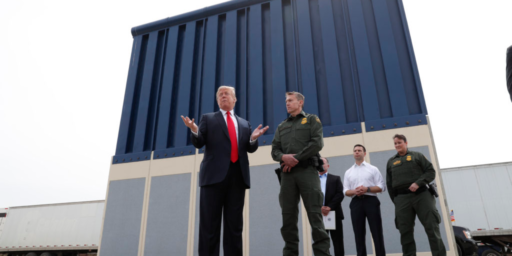Sixteen States, Other Groups, Sue Trump Over Border Wall ‘National Emergency’
The lawsuits against President Trump's "national emergency" have begun. Except more.

California and fifteen other states, along with two other groups of Plaintiffs who have filed lawsuits of their own, have filed a lawsuit challenging President Trump’s declaration of a “national emergency” to expedite funding of his border wall:
WASHINGTON — A coalition of 16 states, including California and New York, on Monday challenged President Trump in court over his plan to use emergency powers to spend billions of dollars on his border wall.
The lawsuit is part of a constitutional confrontation that Mr. Trump set off on Friday when he declared that he would spend billions of dollars more on border barriers than Congress had granted him. The clash raises questions over congressional control of spending, the scope of emergency powers granted to the president, and how far the courts are willing to go to settle such a dispute.
The suit, filed in Federal District Court in San Francisco, argues that the president does not have the power to divert funds for constructing a wall along the Mexican border because it is Congress that controls spending.
Xavier Becerra, the attorney general of California, said in an interview that the president himself had undercut his argument that there was an emergency on the border.
“Probably the best evidence is the president’s own words,” he said, referring to Mr. Trump’s speech on Feb. 15 announcing his plan: “I didn’t need to do this, but I’d rather do it much faster.”
The lawsuit, California et al. v. Trump et al., says that the plaintiff states are going to court to protect their residents, natural resources and economic interests. “Contrary to the will of Congress, the president has used the pretext of a manufactured ‘crisis’ of unlawful immigration to declare a national emergency and redirect federal dollars appropriated for drug interdiction, military construction and law enforcement initiatives toward building a wall on the United States-Mexico border,” the lawsuit says.
Congress is on its own separate track to challenge the president’s declaration. The House of Representatives, now controlled by Democrats, may take a two-prong approach when it returns from a recess. One would be to bring a lawsuit of its own.
Lawmakers could also vote to override the declaration that an emergency exists, but it is doubtful that Congress has the votes to override Mr. Trump’s certain veto, leaving the courts a more likely venue.
Joining California and New York are Colorado, Connecticut, Delaware, Hawaii, Illinois, Maine, Maryland, Michigan, Minnesota, Nevada, New Jersey, New Mexico, Oregon and Virginia. All have Democratic governors but one — Maryland, whose attorney general is a Democrat — and most have legislatures controlled by Democrats.
The dispute stems from steps Mr. Trump said he would take after lawmakers granted him only $1.375 billion for new border barriers, legislation he signed last week to avoid another government shutdown.
Mr. Trump asserted the power to tap three additional pots of money on his own: $600 million from a Treasury Department asset forfeiture fund for law enforcement priorities; about $2.5 billion from a military antidrug account, most of which would first be siphoned from other military programs the Pentagon has yet to identify; and $3.6 billion in military construction funds he said he could redirect by invoking an emergency-powers statute.
Presidents have invoked emergency-powers statutes nearly five dozen times since Congress enacted the National Emergencies Act of 1976, but never before has one been used to make an end-run around Congress after it rejected funding for a particular policy.
(…)
Legal specialists expected the Justice Department to urge a court not to consider facts about the border or Mr. Trump’s words, but rather to defer to the president’s decision. The courts have a long history of being reluctant to substitute their own judgment for the president’s about a security threat.
The Trump administration will have a powerful argument to invoke: In the National Emergencies Act, Congress defined no standard for what conditions have to be met before a president may determine that a qualifying crisis exists.
But before a judge could weigh whether Mr. Trump invoked the statute legitimately, he or she would have to decide whether the dispute is properly before the court in the first place.
Plaintiffs will need to establish standing by showing that they are suffering some particular injury from what Mr. Trump is doing. Several of the lawsuits involve people who own land or represent communities along the Mexican border in Texas, where Mr. Trump has put the focus of his emphasis on the need for more barriers.
But it is not clear whether any of the fencing will be built in California or New Mexico, two of the states in the lawsuit, and it certainly will not be built in other states involved in the litigation, like New York, New Jersey or Hawaii.
Mr. Becerra, California’s attorney general, suggested that plaintiffs in the states’ lawsuits have standing for reasons that are unrelated to whether any portions of Mr. Trump’s wall will be built in their territory, arguing that “the president’s unconstitutional action could cause harms in many parts of the country.”
In addition to the lawsuits filed by the states, there have also been two other lawsuits filed against the declaration even though the announcement of a “national emergency” was made only four days ago. One was filed by the watchdog group Public Citizen on behalf of Texas landowners and an environmental group in Texas. As expected, it basis much of its argument on eminent domain, private property, and environmental issues. A second lawsuit is being brought by the Center for Biological Diversity, Defenders and Wildlife, and the Animal Defense Fund. It is also expected that we will see a lawsuit from the American Civil Liberties Union that would obviously focus primarily on civil liberties issues, another by the Niskanen Center in Washington, D.C. on behalf of El Paso County, Texas and the Border Network for Human Rights. Finally, it is expected that Congress, or at least the Democratic-controlled House of Representatives, will file its own lawsuit alleging that the President’s declaration of a “national emergency” due to the fact that he didn’t get as much funding for his wall as he wanted, and in the face of an explicit Congressional rejection of the President’s request, violates the Constitution. The lawsuit by the states has been filed in the Northern District of California, which of course is part of the Ninth Circuit, a forum where the Trump Administration has not fared well over the past two years. The other two lawsuits have been filed in the United States District Court for the District of Columbia, which has also not been a favorable forum for the Administration. What’s unclear is whether any effort will be made to consolidate these cases, or whether they will proceed on their own tracks under their own momentum.
With respect to the state lawsuit, the biggest issue at the beginning of the case is going to be the issue of standing, and in that respect, the issue could prove to be more complicated for some of the Plaintiff states than it will be for others. Of the states involved in the litigation, only two, New Mexico and California, are located on the U.S. border with Mexico. With respect to those states, one can easily see how they could be impacted by a border wall and by the declaration of a “national emergency” to get it built. Most of the other states, though, such as Minnesota, New Jersey, and Hawaii, aren’t anywhere near the U.S.-Mexican border and it is difficult to see exactly how they’d be impacted by the expedited building of the border wall. Potentially, I suppose, they might be able to make an argument that they will be impacted by the diversion of funds from the Defense Department that the Trump Administration is apparently considering. This is especially true if the reports that at least part of the funds that will be diverted include funding for the Army Corps of Engineers normally reserved for responding to natural disasters and the like are accurate. Beyond that, though, we may end up with a situation where the court rules that some of the states have standing to sue over the “national emergency” declaration where others do not. As a legal matter, that won’t necessarily hurt the underlying legal merits of the case, but even a partial win on standing is something the Administration is something they’ll count as a win.
Not surprisingly, the states’ lawsuit relies heavily on the President’s own words in seeking to undercut his claim that there is a “national emergency” on the border, especially his admission during the press conference where he announced it that he “didn’t need to do this” and that he just wanted things to move faster. This would not be the first time that the President’s own words have come back to haunt him in litigation, of course. We have also seen the same thing happen in the lawsuits over his Muslim Travel Ban and his ban on transgender troops in the military. The lawsuit also makes a number of other factual allegations meant to undercut the President’s assertion that there is a “national emergency” on the border of the type that would justify invocation of the powers conferred by the National Emergencies Act of 1976, although it’s unclear how willing a court will be to look behind the President’s reasons for declaring an emergency given the broad grant of authority that the act confers on him. The lawsuit goes on to allege that the President’s actions violate the principles of Separation of Powers in that it purports to allocate money in ways that Congress has not authorized, that it specifically violates the Constitution’s Appropriations Clause set forth in Article I, Section 9, Clause 7 which grants Congress the exclusive authority to appropriate money, that the declaration is outside the authority granted to the President by the Constitution or Federal Law, and that it violates several environmental laws passed by Congress in that it seeks to bypass normal environmental impact review processes that would have to be followed in the case of other Federal projects. As relief, the Complaint asks for an injunction blocking the emergency declaration and blocking any action aimed at building the wall.
The Public Citizen lawsuit makes similar allegations to the state lawsuit and may have advantages that the state lawsuit does not. Specifically, this is because the primary Plaintiffs in that lawsuit consist of people who own land along the U.S. border with Mexico who would be directly impacted by the construction of the wall. This means that they have a much better case for standing to sue the Federal Government than non-border states probably do. In any case, this lawsuit also raises many of the same legal, factual, and Constitutional arguments that the state lawsuit does and seeks to get the court to look behind the justification for the President’s declaration of an emergency in the same manner that the states’ lawsuit does. The lawsuit also raises claims arising out of the environmental impact of the wall and of any expedited construction process that might result.
Finally, the lawsuit filed on behalf of the Center for Biological Diversity and other groups also is quite similar to the state lawsuit. In this case, the Plaintiffs consist entirely of environmental advocacy groups and, once again, we face a situation where standing is likely to be an issue at least initially. The Federal Courts have in the past been somewhat generous in granting these types of organizations standing to sue when they are raising claims within their purview, but this lawsuit, which raises legal and Constitutional claims about the Separation of Powers and other legal and Constitutional claims. Given that, the Plaintiffs here could face a standing problem before their case even gets off the ground. As with the other two lawsuits, this Complaint seeks to enjoin both the emergency declaration and the construction of the wall.
All three of these cases, as well as those likely to be followed over the coming days and weeks, will proceed forward as normal. In each of them, the first move by the Plaintiff’s is likely to be a request for a Preliminary Injunction by the respective Plaintiffs. Assuming that these requests are granted, the injunction will likely be appealed to the appropriate Circuit Court of Appeals and, perhaps, the Supreme Court. However, it is likely that the injunctions will be granted in most of the cases and that Trump’s “national emergency” will be on hold at least until the 2020 election. Where it goes from there depends on legal developments and on the outcome of the election.
Here is the state lawsuit Complaint:
California Et Al v. Trump by on Scribd
Here is the Public Citizen Complaint:
Alvarez Et Al v Trump by on Scribd
And, here is the Center for Biological Diversity Complaint:
Center for Biological Diver… by on Scribd





I don’t know how these lawsuits work, but if Dennison’s statements are an issue, can he be subpoenaed to testify about the matter?
Oh, I do know it would take months to arrange it, and legal maneuvers galore, but it would be worth it. I mean, could he manage one minute of testimony without perjuring himself?
Sub-headline…EXPECT more.
So the Declaration of Emergency will solve the crises of under employed lawyers, bored court staff and judges the length and width of this great land. Make Lawyers Great Again.
Nothing warms my cockles more than watching small-government Republicans itching to steal private lands via eminent domain…for Dennison’s vanity project.
Is there a single principle that Republicans have not compromised in their obsequience to this Russian asset?
@Daryl and his brother Darryl: Tax cuts. Destroying the environment for profit. Locking up the children of minorities for no reason.
@OzarkHillbilly:
Point taken…Dennison is, in fact, a main-stream Republican.
While the Dennison style often draws comparisons to 1984, deservedly so, it strikes me the situation is more akin to another Orwell work, Animal Farm: the pigs have taken over.
All animals are equal, but some animals are more equal than others.
There is not a “crisis”. A wall is not needed. Most people support immigration. Immigrants come here to escape and get away from socialist, communist countries looking for freedoms and opportunity.
They are law abiding and hard workers.
There are already sections of a border wall in place. What is needed is a “tech” wall that will use electronics and such things as strobe lights that can temporarily blind and disorient, but not injure. Also, a high pitched sound device that can temporarily immobilize a person. The use of netting launchers could also be effective. Virtual reality setups are also an idea.
The use of modern technology to create a wall would be safer, cheaper, and more effective.
There are some areas that are being overran by illegal immigrants. The cities and towns do not have the resources or budgets to help.
People are opposed to illegal immigrants sneaking in. The legal immigrants are opposed to that. They also oppose the “sanctuary” situation.
There is not a “crisis” – problems maybe. A wall is not needed. A type of barrier and security is needed.
See: “Illegal immigrants have turned California into a nightmare”
(Wayne Root, Las Vegas Journal)
@Tyrell:
…Well that response was pleasantly unexpected.
“I’m Committing Professional Suicide”: CBS Star Reporter Admits “Mostly Liberal” Journalists Are Now “Political Activists”
https://www.zerohedge.com/news/2019-02-19/cbs-news-chief-policital-correspondent-breaks-ranks-admits-journalists-are-now
“What a surprise, a lawsuit designed to obstruct a sitting President from fulfilling a key promise that got him elected, filed in a District Court in the 9th Circuit. Go figure.”
https://www.redstate.com/darth641/2019/02/19/leftist-lawfare-begins/
I can see why you would listen to Logan; she filed a wildly misleading conspiracy story re: Benghazi. Had to issue a public apology. Professional suicide? I don’t think she is currently employed as a journalist.
In addition Zero Hedge is part of the alt-right, and a conspiracy rag. I think they have been predicting the collapse of the EU for the last 5 years. Zero Credibility would be a more apt name.
Seriously, Jake…you have to stop reading this crap. It’s making you dumber, and, based on your comments, I really don’t think you were that smart to begin with.
@Jake:
You red hat wearing bone-heads always forget to mention that the campaign promise included Mexico paying for the wall.
If you have to lie (even by omission) to make your point, you don’t have much of a point to start with.
@Daryl and his brother Darryl:
Anyone who disagrees’s with you is a liar, alt right, racist etc
etc etc
You are the definition of cognitive dissonance.
Take a step back and learn.
@Jake: Hey stupid,
Cognitive dissonance is having inconsistent thoughts, beliefs or attitudes.
Maybe you should stick to monosyllables. (Oh, sorry — short words.)
@Jake:
Again…part of the campaign promise was that Mexico was going to pay for the wall.
Logan produced a misleading story and had to apologize.
Zero Hedge is part of the alt-right and pushes conspiracies.
These are all facts…none of which you were able to counter…and the opposite of cognitive dissonance.
@Daryl and his brother Darryl: To Jake, “cognitive dissonance” means “using facts in a way that doesn’t agree with me”.
@Jake: You do realize Jake, that campaign promises are not legally binding? Don’t you?
I must admit I watched very little of Dennison’s campaign. The man is, after all, equally boring, repulsive, and nauseating. But I’m sure I’d have heard if he’d promised to usurp Congressional powers.
Coming back in the thread to things you actually mentioned, Doug, it would seem to me that most states would have standing to object to the President redirecting funding to a wall project of money that was appropriated for projects in their states. IANAL, so I could be wrong, but at least it’s a logical contention/link.
@Daryl and his brother Darryl:
Also very likely a Russian agitprop operation.
Which explains, of course, why all the Trumpist fools read it.
@Neil J Hudelson: It’s still dumb though as an e-fence already exists and patrols with drones were already in place until Trump stopped them.
It’s also dumb because people live on that border and need access to the water for their livestock/farm so the flashing lights and other stuff is stupid/unworkable.
@Tyrell:
Yes, when I want cogent analysis the first source I go to is Wayne Root, a conspiracist, and an avid Birther. Frankly, I’d go to the Psychic Friends Hotline before I’d check out Root on anythiung